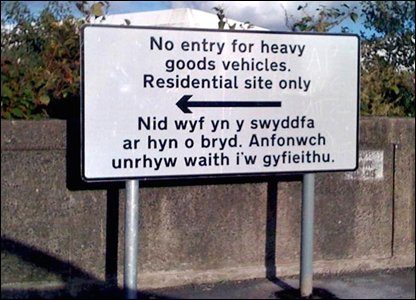A Wales of a Mistake
The United Kingdom is made up of England, Wales, Scotland, and Northern Ireland. These four different constituent countries each have their own cultures and, for that matter, their own languages. While English is the de facto language of the UK, there’s no de jure tongue across the country — with one exception. As of 2011, in Wales, the official language, by law, is Welsh.
That law exists in spite of (or perhaps because of) the fact that Welsh isn’t all that widely even in Wales. Only about a quarter or so of Wales’ population speaks Welsh and significantly less than that use the language daily. But the powers that be in Wales like to help the language along regardless. For example, for decades, the Welsh government has required that road signs be in Welsh and, if also so desired, English. (As of 2016, the law requires that the Welsh copy be placed above the English text, too.) Which is why the problem below happened.

Don’t see any issue? Don’t worry, you’re not alone — neither did Andy Kirby. Unfortunately for him, it was his job to get the sign made.
In 2008, Kirby was working for the highways department in Swansea County, a part of Wales where about a third of the population speaks Welsh. Kirby was not among that third, but that wasn’t an issue — he could do his job just fine speaking only English. And in the case of the sign above, that job was simple. A grocery store had opened in a residential section of Swansea (which makes sense, as regular residents buy groceries). Deliveries to the grocery store, though, were clogging up the streets, so the Swansea highways department decided to make this one roadway for passenger cars only. The sign above makes that clear — if you speak English.
But if you speak Welsh? There’s a problem.
As the BBC reported, Kirby used a translation service to give him the proper copy for the Welsh part of the sign. And when Kirby emailed his translator, the translator replied with the sentences seen above: “Nid wyf yn y swyddfa ar hyn o bryd. Afonwch unrhyw waith i’w gyfieithu.” So, Kirby dutifully placed the Welsh words on the design template and sent the sign off to be made. Unfortunately, his translator wasn’t at work that day, and the two Welsh sentences aren’t a reference to roads or cars or trucks at all. It translates to “I am not in the office at the moment. Send any work to be translated.” Yep: it’s an out-of-office reply.
No one at the Swansea highways department noticed until it was too late. The Welsh-speaking residents of the area got a laugh at the mistake, and within a few weeks, the error spread through the Internet. In an interview with Wales Online, Kirby said that he found out the way most others did — he was on vacation in Spain when rumors of a mistranslated sign in Swansea went viral, and even then wasn’t sure if it was his mistake. It was only when he returned home was he sure: “I went to look at it with a colleague who spoke Welsh and when he looked at it he just burst out laughing. That made me think ‘hello, we’re in trouble here’. It was either incredibly funny or incredibly incompetent.”
Everyone took the mistake in stride, though. Kirby continued in his position with the highways department until his retirement in 2015. And on his way out the door, the sign came back. Per Wales Online, “he was presented with a smaller replica of the sign, with the incorrect translation and all, by his workmates as a retirement present.”
Bonus fact: Wales is home to a mountain which is somewhat notable if you’re from the area — it has some good hiking trails, there’s a nature preserve, and a gold medal-winning showjumping horse is buried there. But its real claim to fame is its name: Blorenge. It’s one of the few English words that rhyme with “orange.”
From the Archives: Why You Shouldn’t Carpool With Winnie the Pooh: A story from Wales. About bees. Lots of bees.
